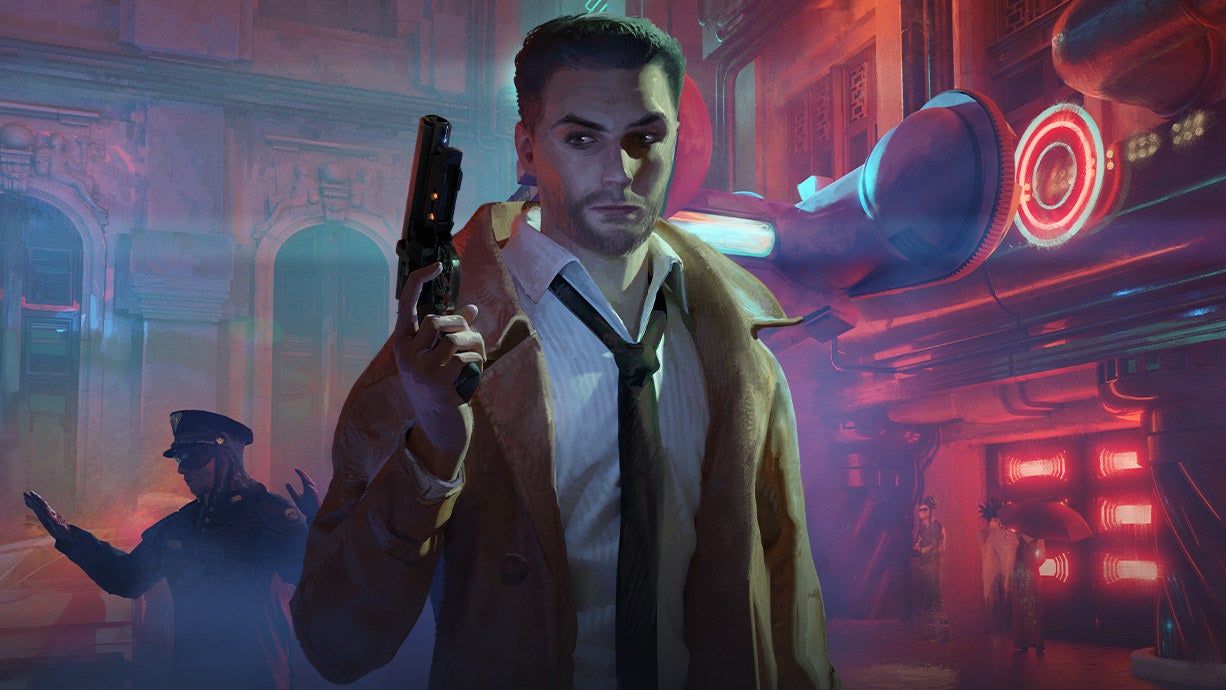There are three reasons to consider playing the new ‘Enhanced Edition’ of Blade Runner over the version which hit GOG in 2019: 1) it has subtitles; 2) it has controller support; 3) it’s on consoles. Beyond that, Nightdive’s remastering has made Westwood’s 1997 adventure game look notably uglier and you’d be better off with GOG’s ScummVM version. The Enhanced Edition is out today and I’ve been flicking back and forth between the two versions, tutting. The Enhanced Edition still looks like a 25-year-old game, only now it looks 25 years old, blurry, and unlike itself.
Released in 1997 by Westwood (yes, the Command & Conquer studio), Blade Runner is not an adaptation of the movie. The adventure game is set in the same city at the same time, but aside from a few cameo appearances it’s telling its own story with its own detective hunting for illegal (maybe) sentient robots. It’s a clever way to handle an adaptation, getting to play with many locations characters, and gadgets from the movie without clumsily forcing it into video game shape. It even echoes the movie’s uncertainty by randomly picking a different handful of key characters to be replicants on each playthrough. I liked it in 1997 and, after years of the game not being sold anywhere, still liked it when a version rebuilt inside ScummVM arrived on GOG in 2019. You should play that version, not this new one.
Nightdive Studios say their Enhanced Edition boasts “reconstruction and upressing” of Westwood’s original video files (the backgrounds are pre-rendered video), as well as taking the framerate of cinematic cutscenes from 15 to 60fps. With original source files lost, they’ve used reverse-engineering and machine learning to rebuild an updated version inside their usual engine, Kex. The end result looks worse than the ScummVM version.
Backgrounds in Blade Runner: Enhanced Edition are blurry messes. Their remastering process has removed many video compression artifacts, sure, but it’s removed a hell of a lot of intentional detail too. It turns complex surfaces into smears, blends highlights into murk, and makes many crisp lines blurry. It even tones down the omnipresent rain which defines the mood of 2019 Los Angeles. It changes the nature of materials too, blurring out bricks and sanding down rust. This city should be grounded in the past, building on the rot of our world with a future gone wrong, and some of this tone is lost here.
I’m not usually one to pore over pixels for minute differences but let’s compare some screenshots. As much as possible, I’ve tried to capture the same frames from both versions (what fun, using raindrops as identifiers!). Click ’em to enlarge, and you can use your arrow keys to flip back and forth.
Most obviously at Howie Lee’s noodle bar, the active characters (distinct from those who are part of the pre-rendered background) are not layered behind smoke and murk as they should be. This might be a bug Nightdive will fix, though it’s not the only place I’ve seen this error. The Enhanced Edition also wipes most rain from the sky and wet highlights from the ground, drying out the city a little. Many bricks on buildings are smoothed out. The towering skyscrapers of the far background are cut short, losing the scale of the city. The highlights on the neon beneath the HOSS sign are muted, changing how loud the city is.
The Enhanced Edition largely removes the Maya-inspired pattern cast blocks of the Ennis House, an iconic Los Angeles mansion (designed by Frank Lloyd Wright) used for Deckard’s apartment in the movie and McCoy’s here in homage. Most of the distinct blocks in the middle of the scene are rolled into one long smear too. It’s such an interesting decision for the decor and architecture of 2019, and this turns it into regular tiles or blocks.
Attribution
To be clear: the original game looked strange even at the time, with the compression artifacts all over. But that did give the world texture, the grit of a Los Angeles detective story. It was a look. I’ve had that Brian Eno quote kicking around my head, about how “Whatever you now find weird, ugly, uncomfortable and nasty about a new medium will surely become its signature”, the thrill of something bashing against technical limitations in its attempts try to express something more. Maybe it’s partially that which makes me still so enamoured with the original game’s look, still impressed by the pre-rendering pushing far beyond what was possible with real-time graphics and baring its flaws in the process. But on top of that, yeah, Nightdive’s remastering definitely has removed detail in an ugly way.
And woof, the brand new main menu might be more user-friendly but where’s the personality? The Enhanced Edition still uses the Kia interface past this point but you no longer start the game tied into the machinery of the world.
If ScummVM hadn’t added support for Blade Runner, and if GOG hadn’t re-released the game, I would welcome the release of an ugly remaster with joy and a sidenote of sadness. But that version does exist, and it’s better. Nightdive reportedly couldn’t build on ScummVM’s work because the open-source license requirements wouldn’t fly with their plans for console releases, and consoles do seem the main reason for this to exist at all. I’m glad consoleers will get to see this game in some form, but on PC it’s near-pointless.
Blade Runner: Enhanced is out now on Steam and GOG for £7/€8/$10, with a 50% discount on GOG if you owned the original. It hits PlayStations, Xboxes, and Switch today too. Unless you need subtitles, controller support, or a console release, you should stick with the ScummVM version. While that is no longer sold separately, it does come bundled with the Enhanced Edition on GOG.
